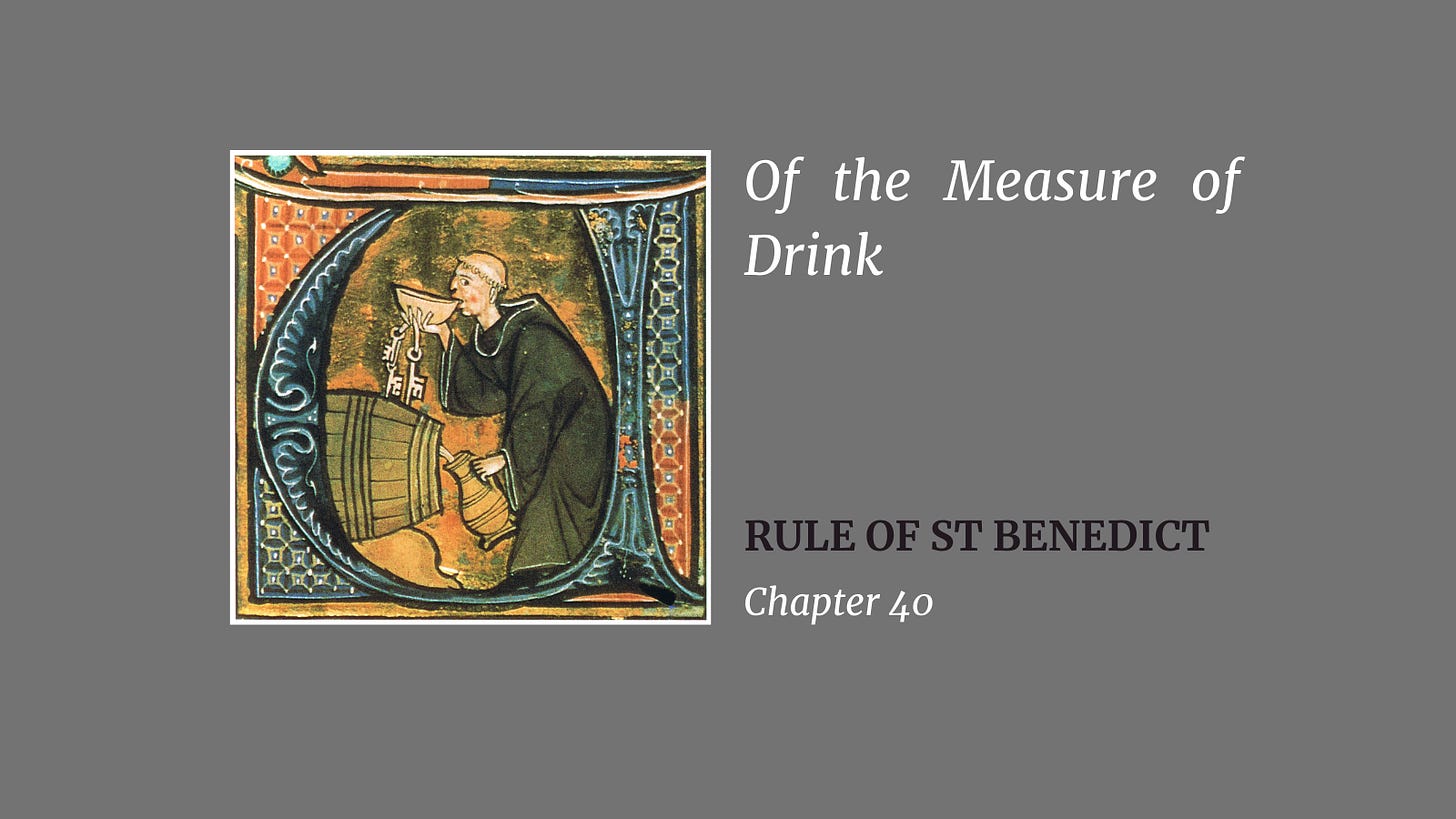Welcome to new subscribers! Each week I post a chapter from the Rule of St Benedict in Latin with my own English translation, along with some comments which come from various writers or my own head. All errors are my own.
Text
Each has his own gift from God: one thus, another thus.
Unusquisque proprium habet donum ex Deo: alius sic, alius vero sic.
And so we set the measure of sustenance for others with some unease.
Et ideo cum aliqua scrupulositate a nobis mensura victus aliorum constituitur.
Yet, considering the weaknesses of the sick, we believe a hemina of wine per person per day is enough.
Tamen infirmorum contuentes imbecillitatem, credimus heminam vini per singulos sufficere per diem.
But let those who God gives the patience to abstain know that they will receive their own reward.
Quibus autem donat Deus tolerantiam abstinentiae, propriam se habituros mercedem sciant.
But if because of the needs of the place, the work or the heat of the summer they require more, it is in the judgment of the superior to grant it, being sure that in all things neither satiety or drunkenness creep in.
Quod si aut loci necessitas, vel labor, aut ardor aestatis amplius poposcerit, in arbitrio prioris consistat, considerans in omnibus ne subrepat satietas aut ebrietas.
We read that wine is not lawful for any monk; but since in our times the monks cannot be persuaded of this, at least let us agree that they must not drink to satiety, but sparingly: for wine makes even the wise fall away.
Licet legamus vinum omnino monachorum non esse; sed quia nostris temporibus id monachis persuaderi non potest, saltem vel hoc consentiamus, ut non usque ad satietatem bibamus, sed parcius: quia vinum apostare facit etiam sapientes.
Where the needs of the place mean that not even the above-mentioned measure can be found, but much less, or even none at all, let those who live there them bless God and not murmur.
Ubi autem loci necessitas exposcit, ut nec suprascripta mensura inveniri possit, sed multo minus, ait ex toto nihil, benedicant Deum qui ibi habitant, et non murmurent.
This above all we warn, that they must be without murmuring.
Hoc autem omnino admonentes, ut absque murmurationibus sint.
Comment
What is a hemina of wine? It’s difficult to be precise, but it may be about half a pint. Was it doled out at mealtimes in the same way as the bread? We really don’t know. Did they drink water as well? What about beer? We know that in northern climes, beer was often the drink of choice, especially during the fasting of Lent. At Cluny, Dom Delatte tells us, a regular amount of wine was served with the meal, but in addition there would sometimes also be an extra mixture consisting of wine, honey, cinnamon and cloves.
As always, St Benedict leaves it to the judgment of the superior, though he says, a little sadly, that wine is not a drink for monks. In this he follows the Desert Fathers, though he did drink wine while at Monte Cassino, following his own principles in his Rule. As always, he makes an exception for the sick, for whom wine is considered medicinal, as in St Paul’s first letter to Timothy:
Do not still drink water, but use a little wine for thy stomach’s sake, and thy frequent infirmities.
1 Timothy 5:23
These days, water is undoubtedly the drink of choice for monks, with alcohol usually reserved for major feastdays.
St Benedict mentions “satiety” a couple of times. What does this mean? St Aelred of Rievaulx refers to this chapter of the Rule in a letter of instruction (De Institutione Inclusarum) to his sister, who was an anchorite. He gives her direction on what to eat and drink, based on this chapter of the Rule, and then goes on to define satiety (my translation of the Latin):
Take what is necessary to avoid hunger but not to satisfy [“satiet”] the appetite.
He draws a line between what we need to eat and what we would like to eat. In a world where excessive consumption is praised, and supermarkets waft smells of food around the place to encourage us to buy more than we need, it’s a good point to remember.
The image of the drunken monk is one that has come down to us, often through anti-Catholic propaganda, but there is some truth in it – lax discipline and lack of spirituality in monasteries can lead to worldly behaviour.
As in all things, moderation is the key.



